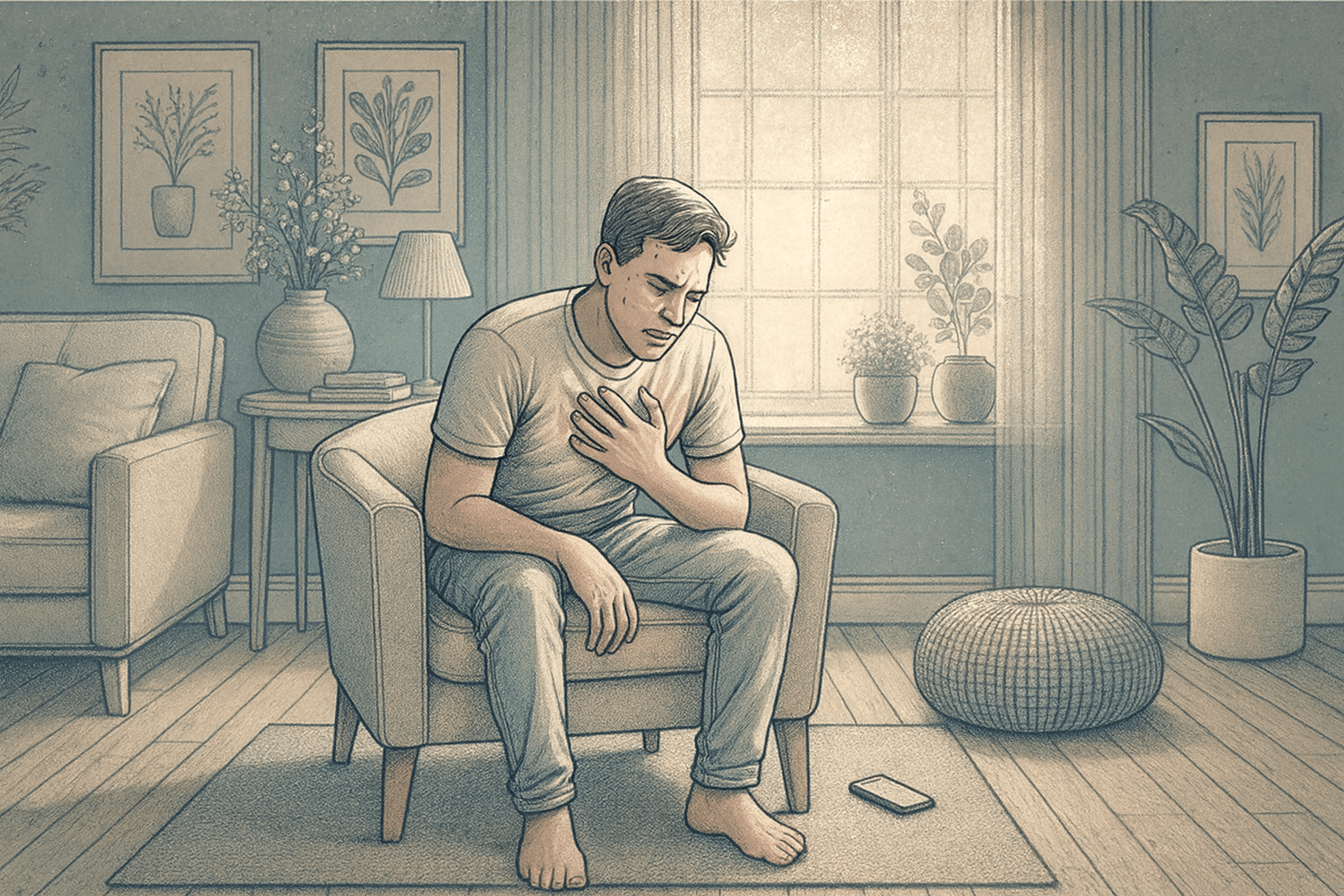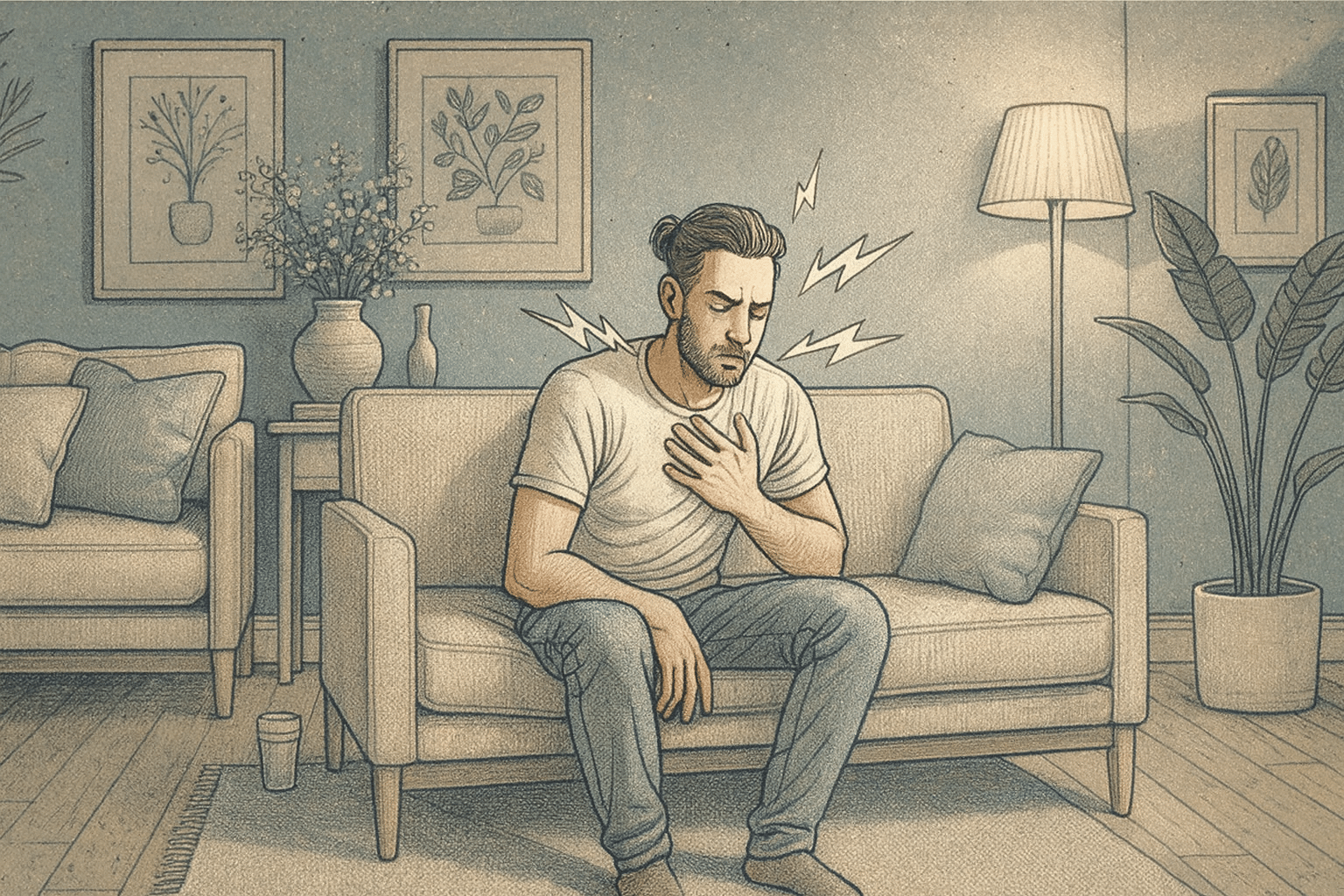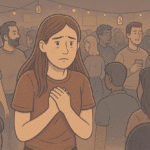Key Takeaways
- Anxiety-induced heart palpitations typically feel like your heart is racing, fluttering, or pounding but are generally not dangerous to your physical health.
- The fight-or-flight response triggered by anxiety causes your body to release stress hormones that directly affect heart rate and rhythm.
- Unlike cardiac-related palpitations, anxiety palpitations usually subside when the stressful situation passes and rarely cause chest pain or extreme fatigue.
- Implementing breathing techniques and stress reduction strategies can significantly reduce the frequency and intensity of anxiety-related heart palpitations.
- At A Mission for Michael, we understand how frightening heart palpitations can be and offer comprehensive support for managing anxiety symptoms affecting your physical wellbeing.
The Connection Between Anxiety and Heart Palpitations
The link between anxiety and heart palpitations is both strong and well-documented. When you experience anxiety, your body activates its stress response system, which prepares you to face a perceived threat.
This ancient survival mechanism doesn’t distinguish between a dangerous predator and a stressful work presentation; it responds to both by increasing your heart rate and breathing to deliver more oxygen to your muscles. What you feel as palpitations is your heart working harder in response to this stress activation.
These sensations can feel alarming, especially when they come on suddenly, but they represent your body functioning exactly as designed during times of stress. The problem isn’t the palpitations themselves but the anxiety cycle they can trigger, feeling palpitations can cause more anxiety, which in turn creates more palpitations.
| A Mission For Michael: Expert Mental Health Care Founded in 2010, A Mission For Michael (AMFM) offers specialized mental health care across Southern California, Minnesota, and Virginia. Our accredited facilities provide residential and outpatient programs, utilizing evidence-based therapies such as CBT, DBT, and EMDR. Our dedicated team of licensed professionals ensures every client receives the best care possible, supported by accreditations from The Joint Commission and the California Department of Health Care Services. We are committed to safety and personalized treatment plans. Start your recovery journey with AMFM today! |
What Heart Palpitations Feel Like

Anxiety-related heart palpitations can manifest in various ways, making each person’s experience unique.
Flutter vs. Pounding Sensations
The quality of heart palpitations can vary significantly among individuals and even during different anxiety episodes. Flutter sensations typically feel like a rapid vibration or trembling in your chest, often described as “butterflies” but located higher than stomach butterflies. This sensation commonly occurs during anticipatory anxiety, like before public speaking or during social situations that trigger nervousness.
Pounding sensations, on the other hand, feel more forceful and deliberate. Your heartbeat becomes not just faster but more intense, creating a thudding feeling that you might be able to hear in your ears, especially when lying down. These pounding palpitations tend to accompany more intense anxiety episodes or panic attacks and can feel particularly alarming because of their strength and prominence in your awareness.
When Palpitations Happen
Anxiety-related heart palpitations often follow predictable patterns tied to your stress triggers. Common scenarios include during or immediately after stressful events, in anticipation of challenging situations, or when worrying about health concerns.
Interestingly, heart palpitations can also appear during seemingly calm moments, especially if you have generalized anxiety disorder where worry operates as a background process.
You might notice them most prominently when trying to fall asleep, as your body begins to relax but your mind continues processing the day’s stressors. The timing of palpitations offers valuable clues about your specific anxiety triggers and patterns.
Duration of Anxiety Palpitations
One distinguishing feature of anxiety-induced palpitations is their duration pattern. Unlike some cardiac-related palpitations, those stemming from anxiety typically begin suddenly and end relatively quickly, usually within a few minutes as the immediate stress response subsides.
The timeline can vary based on the nature and duration of the anxiety-provoking situation. Brief stress might cause palpitations lasting just seconds, while ongoing anxiety states can lead to episodes that wax and wane over longer periods.
Anxiety vs. Heart Problems
Key Differences in Symptoms

Distinguishing between anxiety-related palpitations and those caused by actual heart problems can be challenging, but several key differences exist.
Anxiety palpitations typically occur during or immediately after stressful situations and resolve when the anxiety subsides. They’re often accompanied by other anxiety symptoms like sweating, trembling, and a sense of worry or dread.
By contrast, cardiac-related palpitations often occur independently of your emotional state and may worsen with physical activity. They’re more likely to be accompanied by symptoms like chest pain, severe shortness of breath, fainting, or extreme fatigue.
Another telling difference is duration. Anxiety palpitations typically last for brief periods and resolve completely, while cardiac issues may cause persistent or recurrent episodes that don’t clearly connect to stress levels.
Warning Signs of Serious Conditions
While most palpitations are harmless and anxiety-related, certain warning signs suggest a need for immediate medical attention.
If palpitations are accompanied by chest pain that radiates to your jaw, neck, or arm; severe shortness of breath; fainting or near-fainting; or unusual sweating unrelated to temperature, these could indicate a serious cardiac issue requiring emergency care.
Similarly, palpitations that consistently occur during physical activity rather than emotional stress warrant prompt medical evaluation.
When to See a Doctor
Determining when to seek medical help for heart palpitations can be challenging, especially when anxiety is a known factor.
As a general guideline, new or changing palpitation patterns should be evaluated by a healthcare provider. This is particularly important if you’ve never experienced palpitations before or if their nature, frequency, or associated symptoms have changed significantly.
Red Flag Symptoms To Look Out for
- Chest pain, pressure, or discomfort, especially if it radiates to your arm, jaw, or back
- Severe shortness of breath or difficulty breathing
- Fainting, near-fainting, or extreme dizziness during palpitations
- Palpitations that consistently occur during physical activity
- Persistent heart rate above 120 beats per minute while at rest
- Palpitations accompanied by unusual or excessive sweating
- Family history of sudden cardiac death or serious heart rhythm disorders
The presence of any of these red flag symptoms signals the need for immediate medical attention, ideally through emergency services. These symptoms could indicate conditions like arrhythmias, heart valve problems, or even heart attacks that require prompt treatment.
Don’t hesitate or try to “wait it out” if these warning signs are present. Seeking immediate care could be life-saving.
Managing Anxiety
Learning to manage occasional anxiety and palpitations represents a significant milestone in recovery. This doesn’t mean eliminating anxiety completely; rather, it means developing a new relationship with anxiety where it no longer controls your life or limits your choices.
Working with a mental health professional can provide you with the right tools to manage anxiety inducing thoughts allowing you to participate fully in life’s meaningful activities even when anxiety occasionally appears.
Know that setbacks are normal, and having a difficult day doesn’t erase your progress. Overcoming each challenge builds resilience for the future.
Finding Heart Health and Peace of Mind with AMFM
At A Mission for Michael, we understand how terrifying heart palpitations can feel and recognize that dismissing them as “just anxiety” doesn’t address the very real distress they cause.

We create an environment where you can learn to manage symptoms while addressing underlying anxiety patterns.
Our comprehensive approach treats both the psychological roots of anxiety and its physical manifestations, including heart palpitations. Through evidence-based therapies like Cognitive Behavioral Therapy, mindfulness practices, and stress management techniques, we help you develop practical tools to break the cycle of anxiety and palpitations.
Our personalized treatment programs acknowledge that every person’s experience with anxiety is unique. We combine proven therapeutic methods with holistic approaches, helping you to manage symptoms while addressing underlying anxiety patterns.
When anxiety palpitations are controlling your life, we’re here to help you reclaim both your heart health and peace of mind through compassionate, expert care.
Frequently Asked Questions
Can anxiety palpitations actually damage my heart?
No, heart palpitations caused by anxiety alone do not cause physical damage to your heart. Your heart is designed to handle variations in rate and rhythm, including temporary increases during stress responses.
While the sensations may feel frightening, they don’t indicate harm to cardiac tissue or increase your risk of developing heart disease.
How long do anxiety-induced heart palpitations typically last?
Anxiety-induced palpitations typically last from a few seconds to several minutes, rarely persisting beyond 10–15 minutes at peak intensity. The duration depends on how long your body remains in a heightened stress state and how quickly your relaxation response activates.
Unlike cardiac arrhythmias, anxiety palpitations generally subside as the stress response diminishes.
Can caffeine make my anxiety palpitations worse?
Yes, caffeine can significantly worsen anxiety palpitations. Caffeine blocks adenosine receptors, increases adrenaline production, and heightens nervous system activity, all of which can trigger or intensify heart palpitations.
Individual sensitivity varies widely, with some experiencing palpitations after just half a cup of coffee while others can tolerate more.
When should I see a doctor about heart palpitations?
Seek immediate medical attention if palpitations are accompanied by chest pain, severe shortness of breath, fainting, unusual sweating, or if they consistently occur during physical activity.
New or changing palpitation patterns should be evaluated by a healthcare provider, especially if you have cardiac risk factors or family history of heart disease.
How does AMFM help with anxiety-related heart palpitations?
A Mission for Michael addresses both the psychological and physical aspects of anxiety through comprehensive treatment programs. We use evidence-based approaches including CBT, mindfulness practices, stress management techniques, and holistic therapies.
Our personalized treatment plans help you understand the mind-body connection while developing practical tools to manage palpitations and reduce overall anxiety symptoms.












